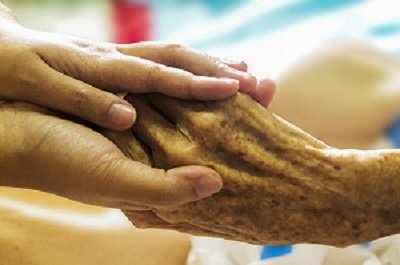Dementia Diary Day 17
Cissy! I Held a Man's Hand
Dear Dementia Diary
Earlier in the day I was talking to a lady whose husband is suffering from Behavioural Covariant Frontotemporal Dementia (bvFTD). Presently, her husband is staying in a locked ward at a local cottage hospital. The lady is trying to find funding for a place for him in a specialist care home about fifty miles away and struggling to persuade the local authority to make a major contribution toward the cost.
 I'm in here somewhere. Plase come and get me
I'm in here somewhere. Plase come and get meI knew it wouldn’t happen. Her husband would eventually end up in a normal dementia care home like here. The cost? £84,000 a year. That amount of money would pay for the care of almost three dementia patients. There was no way that the local authority could justify spending that much for just one patient. I didn’t say anything.
If that failed, the lady told me, then she would bring him home to care for him herself. I don’t know if you’re aware of Frontotemporal Dementia, especially behavioural covariant Frontotemporal Dementia bvFTD.
I suggested to her that no matter how much you love someone looking after someone with dementia is exhausting and that unless you take care of yourself, you will end up being so weakened that you will not be able to offer the care required.
Dementia, Chocolate, Monkeys and a Chat
When I walked into the lounge, Margaret and a few of the walking wounded were eating bowls of vanilla ice-cream swamped in a sickly-sweet chocolate sauce. Heather was helping Charles enjoy his and told me that Mam had already eaten hers and really enjoyed it. I thanked her and asked where the ice-cream came from. Fortunately, the cook in the kitchen a few floors down was clearing his freezer ready for new stock.
Holding an empty bowl, Vernon - who talks a good diet - cocked his head and gave me a sheepish grin of defeat. It must have been an exhausting day if Vernon’s taking such a blatant counter-hit. No sly cigarettes today.
In the background, Gwendolen was banging on the window and Margaret kept shouting Come in!
It is funny. It’s slapstick comedy at its very best. An outsider would be disgusted. Not me though and none of the other staff, because funny is healthy and you should never contaminate anything that is genuinely funny with guilt for having laughed.
It is healthy to laugh. Laughter is a fleeting transcendental respite that doesn’t call for you to smoke something illegal outside the wedding reception with the bridesmaids.
A Respectful Abuse of Dementia Cause Memory Loss
We were watching the same natural history programme as last night. Dementia-caused loss of memory allows cynical and seemingly cruel employment of the opportunity created by the condition. If it engages the dementia patient, then Sod It! it has value in reducing anxiety rather than having to watch a loved one in distress that you cannot explain away to them.
Anything that temporarily stops you and a loved being destroyed by trauma has value.
The staff continued to be fascinated that Mam and Janine were engrossed in the programme. The three of us watched for a while and Mam and Janine groaned in disgust when the vet dug a huge grub-like ‘thing’ out of the lump on a howler monkey’s neck.
Again, Mam pointed and smiled at the baby spider monkey and she and Janine loved the brilliantly coloured macaws.
Mam was in a nice mood again this evening when I arrived and the Russian Roulette prayer outside the ward security door was answered favourably. David was rearranging the tables and chairs in the dining area and Robert was seated at the main lounge table bent over with his head just above its surface. It looked dreadfully uncomfortable and a clear physical representation of the deep and desperate depression he was suffering.
I put a hand on his shoulder and said, Hello. Robert just mumbled something in response. Gerald, the day-shift’s team leader, raised his eyes to me and shook his head. I mouthed, Bastard of illness back at him and he nodded.
Anyway, I received a beautiful hug and a kiss from Mam and sat down one side of her and said a quick hello to Janine who was sat on the other. I think they were having a conversation when I walked in.
Just Say Anything But Don’t Leave Me
I have listened to a few conversations between dementia patients not yet declined too far in this ward. The chats are structured and there is always the simple learned courtesy of waiting for the other person to finish before speaking yourself. This can happen with two patients who are no longer coherent in their use of language.
That what one person is saying to another bears no connection with that the other has just said is completely irrelevant. It does not matter in the least bit. It is the reassurance of talking with someone else and of establishing and maintaining a basic human connection that matters.
I have mentioned earlier in my diary that David will stand in front of you and utter the same short phrase over and over. I talk back to him and receive the same phrase in response again and again. We’re having a conversation, plain and simple. David smiles at me from somewhere very far away indeed.
Sometimes the eyes seem to be squeezing a smile from a place of coldest desolation. That a person can exist in such a place scares me.
Monkeys, Bananas and Stealing Chocolates
I opened the small box of chocolates and made sure both ladies picked a sweet that was a wrapped rather than sealed, otherwise Janine would be there for ages unable to get at the chocolate she loves. I went over to Margaret and offered her the box into which she dug a fist and came out with about four. Oops! She said. I waved a hand and winked at her. Enjoy.
Sofia and Mary were nowhere in sight. Both were being changed into their nightdresses and dressing gowns. It's not as cold here this evening as last night; however, I would sooner see everyone in a jacket or dressing gown. Margaret was wearing her usual green blanket.
In the evenings, when all the ladies are sat drinking supper tea in their dressing gowns, everything seems so normal and beautiful. It IS beautiful. It’s enough to transport you to believing you’ve accidentally walked into the home of spinster sisters in the late evening.
When Mary and Sofia appeared I shared some chocolates with them. Sofia looked lovely and elegant in her silk dressing gown and Mary looked like a loved favourite aunty – with Mafia connections, of course. No-one had fallen over in suspicious circumstances for a few days now.
Gwendolen had three bananas resting on the armrest of her chair and Janine kept talking about the chocolates and ice cream.
A family friend, Jean, who usually worked on one of the other wards was on duty here tonight and she had also seen the original BBC Natural World programme on telly. Jean enjoyed giving us all a gruesome and detailed explanation of the vet pulling the Botta fly from the big lump on the howler monkey's neck. I asked if anyone wanted to see it again. It was clear from everyone’s groaned response no-one did.
If you find yourself obliged to think about placing a loved one in a
care home, then it is important that you research dementia care homes.
Information about Care Homes Link
If you have further information that might be useful to other family or friend caregivers please feel free to use the Contact Me section near the bottom of this page.
 Love is the Anchor
Love is the AnchorHolding Hands Can Be Enough of An Anchor
If you have never encountered a dementia patient, you probably have a fixed vision of people wailing down corridors or near-comatose in armchairs because of over-medication. It’s true that Albert appears to be an individual in complete mental and physical stasis, yet the staff talk to him all the time. Same goes for Bryan, a former salesman whom I haven’t seen for a long while now.
Everyone moves up and down a spectrum of dementia symptoms. Some fluctuate a bit forward and a bit back at the top end like Sofia. Some like Margaret move along a much broader part of the dementia spectrum that Mam no longer can.
Some of the dementia patients have lost the power to communicate coherently with us. Nonetheless we try. We dismiss their illnesses, whether Alzheimer’s disease, Frontotemporal Dementia, Parkinsonian, Vascular dementia or any of the other types of dementia.
It is all about being entirely with the person as they present themselves to you. We all know when people are happy, sad, confused, angry or aggressive because their entire demeanour shows the emotion. You therefore respond accordingly, acknowledging that person is mostly in a state of isolation and simply wishes to be communicated with and their existence acknowledged.
Holding hands with a confused or deeply distressed person is a wonderful thing to do, I’ve discovered. Who thought I’d be holding hands with a man and meaning the affection I was trying to share with him.
Talking and listening to any person with dementia symptoms or not shows the person that you really care about what they are saying; moving into their emotional world and staying there to keep them company for a while. For that time, I am anchor holding Robert in a safe place.
Memory loss is one of the earlier and main symptoms of Alzheimer's disease. I think that Robert suffers from one of the Alzheimer’s diseases - I guess so from the aggression he sometimes shows. Loss of memory, as I have written elsewhere, results in the loss of the fixed physical and emotional reference points around which we build our identity. So, when I walk in the ward I frequently find Robert staring keenly at me.
Do I recognise this person? I know I’ve met him before. Family?
I always try to say something nice, using his name and ask whether he’s seen Mam. I ask him how he’s been and tell him I’ve heard he is going home in a few days. A lie he will have forgotten in a few hours. If it helps him along for a while, then that’s alright.
At Least Try to Show You Care
I like to leave as close to eight o'clock as possible and hope, quite cruelly, that my Mother will be asleep by then or dozing off. Once again tonight, it was neither, the programme had kept her bright and awake and I think that's great. But remember that I must be occasionally selfish to survive.
Had I the choice then I would give up work and spend time here as a volunteer. June, one of the carers, suggested that very thing this evening.
Anyway, the night time carers came in and thought it so sweet that the two elderly ladies were watching the programme and found themselves compelled to watch. Amusing.
Supper was toast, tea and sandwiches. Porridge for those who wanted it. They serve much better food than the local authority, even if it is simple.
The local authorities aspire to minimal standards rather than optimal staffing in a home that had too many corners around which people have accidents and remain undiscovered for too long. The carers are brilliant, though and it is the lack of investment in resources that defeats much of what they want for their patients.
Postscript - You can't rationalise with Guilt.
Before the end of the programme Gwendolen got up and left, but not without demanding that we come with her. And she became angry that we didn’t want to. She had been worrying earlier about getting home and cooking lunch for the children.
Sofia came around every now and then and touched my hair or beard. I remain convinced that I am being chatted up by her. Nonetheless, I do give her cuddles, especially when she looked really lost. At least I make her smile, which is more than I achieve with women in general.
While my mother is eating - wanting to share her food with me - I say I'm taking the iPad to the car to charge up the batteries. I abandoned her again and took away the iPad that had brought her and the other ladies a small degree of happiness this evening.
I hate Feelings. You can't rationalise with Guilt.
Do you have any advice or stories to share?
Please feel free to share
Return to Dementia Devotion Home Page
Return to Dementia Carer Diary
This website was built with SBI

Recent Articles
-
Dementia Diary. We Must Break Her. It's my name she calls constantly
Dementia Diary. We’ve Got To Break Her.We had all agreed that we had to accept and commit ourselves to the hope that the dementia carers would become her family -
Dementia Diary Page 3. Love, Trauma and Laughter all within minutes
A Dementia Diary. The days that passed were full of Love, Laughter, Kindness and Exquisite Pain. Be ready to weep, laugh and, as usual, hate bastard rabbits. -
Dementia Devotion - Beautiful Karen Carpenter just ran out of time
Dementia Devotion - I keep thinking about beautiful Karen Carpenter who was so caught up in other people's demands that she ran out of time to save herself. -
Betty suffered dementia the last few years and was a very nice lady
Dementia Diary Day 31 Red Squirrels, Rabbits (again) & Suicide Salad - The first news I heard this evening from the Head Nurse, was that Betty had just died -
dementia diary day 30. Has The Mafia Assassin Revealed Her Identity?
Has The Dementia Care Home Assassin Revealed Her Identity? Her right eye was swollen, almost closed and the bruising ran from darkest blue, purple to black -
Dementia Diary Day 20 - Purpose, Futility & Bastard Rabbits!
Dementia Diary Day 20 - Purpose, Futility & the Bastard Rabbits! Eating My Garden







